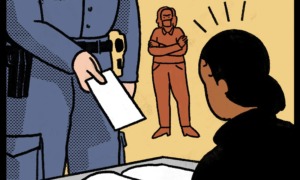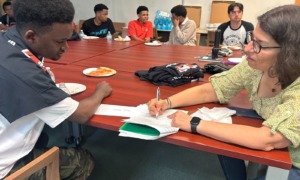***JJ Today mentioned earlier this week that the 2009 appropriations for juvenile justice spending were out, and since then we’ve had a chance to give the enormous list of JJ earmarks a once-over. First impression is that a lot of pork from the Byrne Discretionary Grants went to re-entry programs for juveniles coming back into the community. Meanwhile, the earmarks to be managed by the Office of Juvenile Justice and Delinquency Prevention (OJJDP) are heavily focused on wide-scale prevention: mentoring, after-school program, preventing gang affiliation. It’s possible that OJJDP would manage the Byrne earmarks that pertain to juveniles though.
This is one of the problems with earmarks. Who is going to call money for after-school programs a waste of time or dollars? Nobody. But we have a whole office that handles that: the Department of Education. Are these after-school programs specially targeted at juvenile offenders, or even at youth who are likely to offend? Not likely.
There is a lot of excitement in the field about the prospect of a great leader at OJJDP; most people seem to like all of the strong candidates. But whoever it is, his or her impact will be severely limited if Congress dictates virtually their entire discretionary budget.
Some earmarks that caught our eye:
*$250,000 to Hennepin County, Minnesota, to facilitate the sharing of juvenile records between criminal justice agencies
*$100,000 to Inner Harbour for Children and Families for neurofeedback treatment to help troubled youths overcome deficits. Inner Harbour got about $500,000 for this last year and was set to receive that amount again. There is some question about the legitimacy of neurofeedback, so we intend to look harder at this group.
*$250,000 to the New Jersey Institute of Technology to develop technology that would reduce accidental shootings and teen suicides. Really? Can’t wait to find out what that technology is.
***Bill Byars, head of the South Carolina Department of Juvenile Justice, told us in December that he would ask the state to deficit spend in light of the brutal cutbacks to his budget brought on by the recession. South Carolina has a budget control board that issues the spending slashes necessary during tough times, but the board can also can grant the authority for an agency to run a deficit.
Byars’ central argument was simple: If you cut me back too much, the state will fail to meet standards that got it out from under a federal lawsuit. He was successful.
***As expected, the Juvenile Law Center has filed a class-action lawsuit against the two Luzerne County (Penn.) judges who filled two juvenile facilities with youths for cash. The suit covers 70 youths, and names 14 defendants that are all persons or incorporated entities connected to the judges or to Mid-Atlantic Youth Services. Now, the courts will have to sort out how to merge JLC’s suit with the two other class-action suits brought earlier in February by private lawyers.
***Elsewhere in Pennsylvania, the Pittsburgh Post-Gazette‘s Daniel Malloy wrote this piece on the philosophical problems posed to the legal world by the case of 11-year-old Jordan Brown, who is accused of shooting his father’s 26-year-old fiancée while she slept.
***Texas Youth Commission Ombudsman Will Herrel says reform of the JJ system has led Texas to certify more juveniles as adults. Local coverage here and here.
***A rising tide of juvenile prostitutes had been reported recently by police in the Puget Sound area of Washington State, and the FBI took action. A sweep in the state rescued 10 child prostitutes and will likely lead to federal charges for their pimps. Some Seattle politicians have been stumping to get better health and vocational services for juvenile prostitutes.
***A few new resources are available on restorative justice from Living Justice Press, which specializes in restorative justice, particularly in Native American communities. Details on the books are here.
***We listed a bunch of grants that Public Welfare Foundation grants made this month, but totally missed one important one: $206,000 over two years to Los Angeles-based National Health Law Program for an initiative to train juvenile justice practitioners to access Medicaid-funded community-based mental health services for youth in the juvenile justice system. Very interested in how that goes.






























